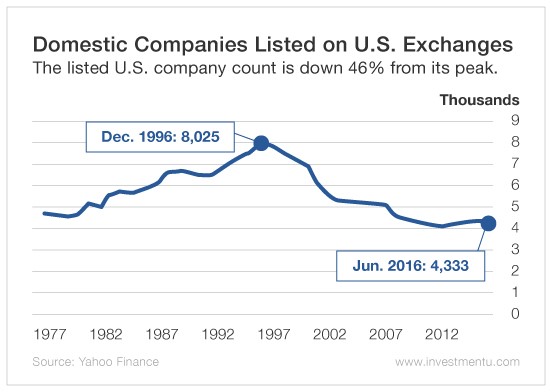
It’s no secret... The stock market is shrinking.
As you can see in this week’s chart, from its peak in December 1996 to June 2016, the number of companies listed on U.S. exchanges dropped 46%.
Yes, you’re reading that correct. The number of stocks available to American investors has dropped by nearly one-half in about a 20-year time frame.
Now, it is unlikely that we will see another 46% drop over the next 20 years. But it is also unlikely that we will see the number increase back to previous levels.
This is not due to a shortage of new companies in the economy. In fact, that number is still growing.
So what has caused the decrease?
Since 1996, there have been a few reasons:
- There has been a large number of mergers.
- Companies are choosing to go private or are failing to meet listing standards.
- Certain sectors have seen surges in bankruptcies.
While these have all lead to a drop in publicly traded companies, it may not be the biggest reason. The fact is that many companies are just choosing to not go public.
Companies like Uber and Airbnb, both of which are quite successful, have thus far chosen to remain private.
But why?
For starters, there isn’t much incentive for private companies to go public nowadays. With plenty of venture capital funding available, there’s really no need to.
Then there are the costs of going public.
It is estimated that 14% of the funds raised in an IPO go to the underwriting and registration costs. That is a big chunk of change for a young company to pay out. And considering that founders are normally pouring all of the funds raised back into the company, that percentage must feel even higher to them.
While money is a big factor, it is not the only factor. Many executives at young companies balk at the administrative hassles involved in going public.
Between a volatile stock market, increased demands from shareholders and a maze of regulations, why would they want to run publicly traded companies?
How many times have we seen a company’s shares skyrocket in an IPO, only to come crashing down in the weeks, months or years to follow?
Just take a look at Twitter Inc (NYSE:TWTR) and its short history. Its IPO was a great success... But since 2013, the stock has been steadily rolling downhill. It’s currently down around 75% from its peak.
Of course, there are still certain companies that will benefit from going public.
But as it stands now, it seems like many of the well-known startups are choosing to stay private.
That’s why private equity is becoming an increasingly important part of a well-rounded portfolio.
